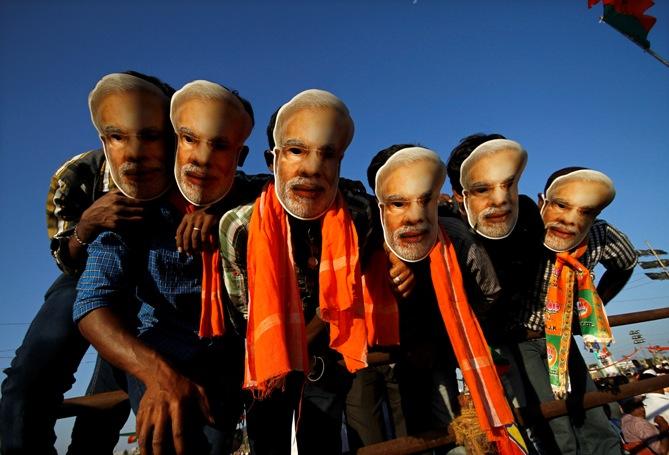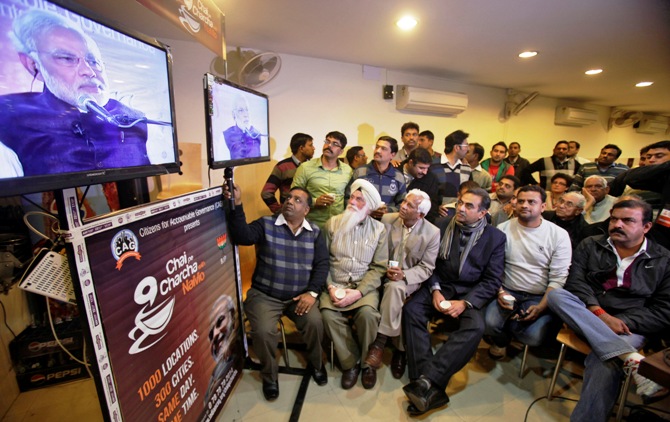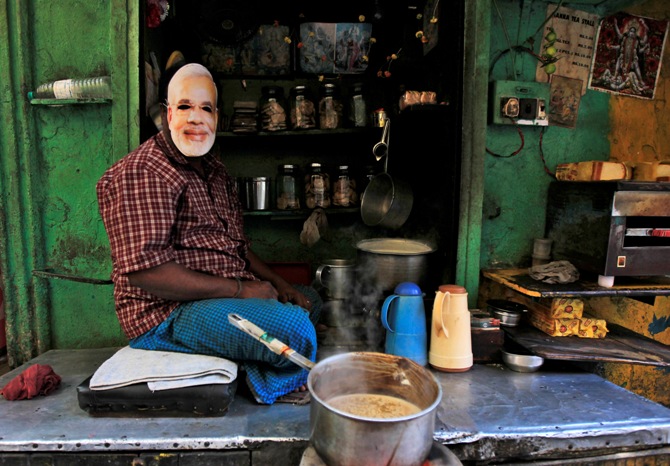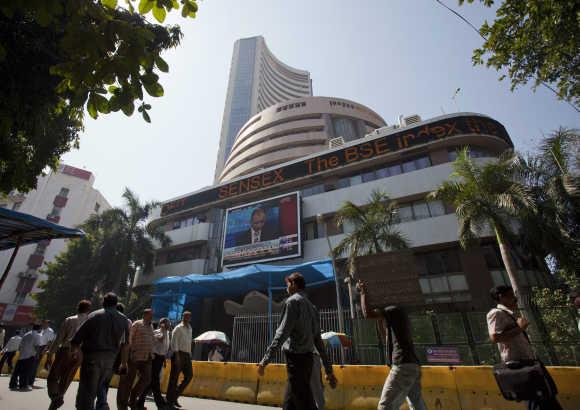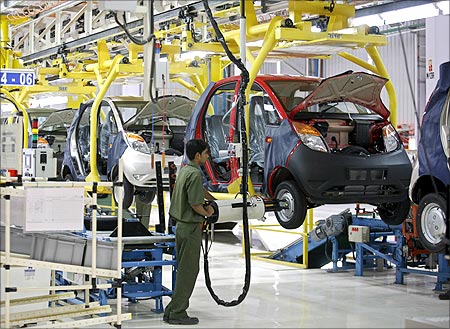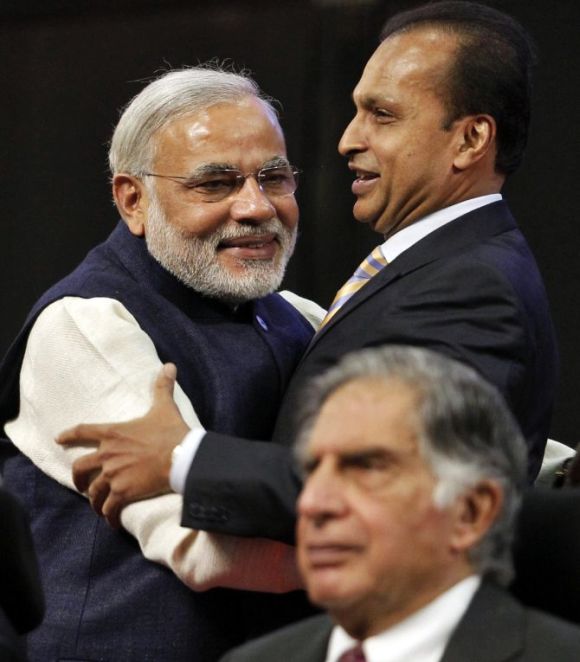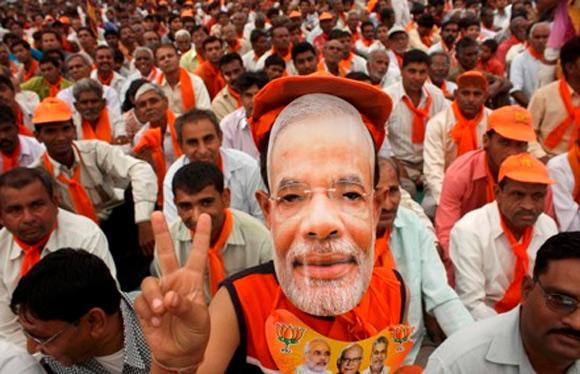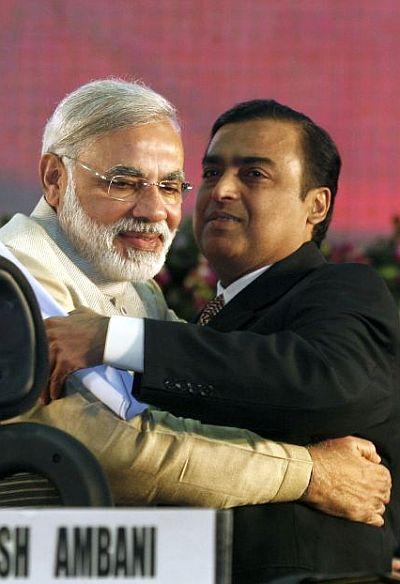 | « Back to article | Print this article |
How good is Narendra Modi's business agenda?
Though stock market indices can be relied on to break records should Narendra Modi come to power, the question is whether business is really the unalloyed force for good, rues Kanika Datta
Narendra Modi, so one popular narrative goes, is Good for Business.
That is the subtext to the United States’ decision to officially end its fatwa later this week when envoy Nancy Powell meets the Gujarat chief minister and the Bharatiya Janata Party’sprime ministerial candidate.
To be sure, the thaw was already setting in during the theatrical Vibrant Gujarat event last year at which Indian businessmen outdid each other in offering hyperbolic accolades to the chief minister’s business-friendly outlook.
But domestic business endorsement for Mr Modi never wavered, not even after 2002. The big change was the large-ish US business delegation that attended that show, nine years after that country denied Mr Modi a visa, conspicuous among several foreign contingents.
Click NEXT to read further. . .
How good is Narendra Modi's business agenda?
Last August, an ultra-conservative Republican Congressman from Illinois called Aaron Schock, who shot to fame in America for displaying an impressively muscled body on a health magazine cover, set the scene for Mr Modi’s rehabilitation by fulsomely praising the Gujarat Model after meeting the state’s chief minister (though he was careful not to name Mr Modi).
Thus, with Ford, General Motors, GE, DuPont, AT&T, Novartis among the US blue chips operating in Gujarat state -- most of them, in fact, predating Mr Modi -- and opinion polls predicting a strong BJP showing in the impending general election, realpolitik has quickly asserted itself in Indo-US ties.
Click NEXT to read further. . .
How good is Narendra Modi's business agenda?
Though stock market indices can be relied on to break records should Mr Modi come to power, the real question is whether business is really the unalloyed force for good, the platform on which the BJP’s prime ministerial candidate is campaigning.
The familiar argument about job expansion in a business-friendly environment is unexceptionable, of course.
But it is increasingly becoming clear that employment is just one aspect of this dynamic.
How business conducts itself as a genuine force for good is becoming another issue, and whether Mr Modi can mould this enthusiastic support base into such a force is an open question.
After all, Gujarat is a small part of India.
Click NEXT to read further. . .
How good is Narendra Modi's business agenda?
Consider the news that five small cars made in India, including by multinationals, failed an independent crash test by the Global New Car Assessment Programme, a United Kingdom-based charity chaired by the colourful Max Mosley, former head of FIA, motor sports’ governing body.
The manufacturers concerned feebly asserted that they met Indian standards. Indian standards exclude the dynamic crash test, which basically involves crashing a car into an obstacle at 55 kilometres per hour.
These tests are expensive -- the overheads, including the dummy, cost over $200,000.
A US car manufacturer said these tests could add $1,000 to the cost of a car.
In the Indian market, where price drives volumes, no car maker has thought it expedient to push for a test that will enhance driver and passenger safety.
Click NEXT to read further. . .
How good is Narendra Modi's business agenda?
Most protest that Indian buyers are unwilling to pay for extra safety (partly true) but there has been pushback from the industry too and no government has had the nerve to oppose its powerful lobbies.
Now, over 70,000 of the 143,000 annual road fatalities in India are driver-related.
Mr Modi’s state has a significant amount of investment from automobile manufacturers. Would he press them to shrink margins and install mandatory safety equipment if he occupies 7 Race Course Road?
After all, if more Indians are going to grow rich as a result of his amazing development agenda, as he seems to promise in rally after rally, surely they will buy more cars.
Click NEXT to read further. . .
How good is Narendra Modi's business agenda?
Similarly, some large car manufacturers have robustly opposed pricing parity between diesel and petrol since the former powers their best-selling utility vehicles.
Ditto for a tax on diesel cars, and the government has unsuccessfully tried for several years to convince car makers to introduce cleaner fuel standards.
The illogic of all this is hard to deny.
For one, owners of private diesel cars (many of them ultra-luxury models), utility vehicles and commercial vehicles are the biggest beneficiaries of the government’s diesel subsidy.
For another, India’s smoggy cities and roads congested with diesel-run large cars are grim testimony to this skewed policy.
Click NEXT to read further. . .
How good is Narendra Modi's business agenda?
Would Mr Modi care to antagonise industrialists who have been his biggest endorsers if he finds himself on Raisina Hill by tightening policy in citizens’ interests?
Or consider labour laws.
Industry wants the right to hire and fire, a reasonable demand in these competitive times.
No government has had the courage to push this agenda.
In a former BJP-led dispensation, when Yashwant Sinha courageously proposed raising the limit of the number of workers in units seeking government permission for closure from 100 to 1,000, a Rashtriya Swayamsevak Sangh-backed union opposed it.
A via media limit of 300 workers never saw the light of day either.
Click NEXT to read further. . .
How good is Narendra Modi's business agenda?
The question is whether Mr Modi can so strongly oppose the parent organisation that helped propel him to leadership, despite his hate-love relationship with it.
Or, indeed, antagonise the people who are more likely to line up at the hustings to vote for his party than the denizens of the business districts.
Whether it is land acquisition or environmental norms, all these are issues for which industry’s agenda clashes squarely with citizens’ interests.
The United Progressive Alliance’s willful ennui in tackling them has helped industry develop a strong sense of grievance.
But Mr Modi is untested too.
